From
Dating to
Disaster
A Dunedin man believed his new boyfriend
was funny, driven, authentic — not a
veteran criminal with dozens of convictions.
Rob Kidd reports on a hook-up that became
a relationship that became a nightmare.


Before Josh Williams was impersonating a cop or announcing his own death as a search and rescue coordinator, before he was a self-styled, satirical news anchor or a violent meth addict, he was a clenched torso on Grindr.
He messaged Luke* on the gay cruising app and while his photos may have exaggerated his stature, the 33-year-old compensated for it with charm.
Luke had repressed his sexuality while growing up, and dating in Dunedin was an exciting, if terrifying, prospect.
“I had only just given myself permission to be gay,” he told the Otago Daily Times.
“I was just fresh out of the closet, I guess, so pretty naive.”
After their initial meeting in November 2021, he saw the man 10 years his senior increasingly frequently.
Luke said he was drawn to Williams’ authenticity.
“I thought he was mature, he was living by himself, he talked about his career,” he said.
“He just came across like a grown-up.”
They cooked together, visited op-shops, took day trips to the beach.
Williams formalised his intentions with a “date-me cake” bought from New World; a frugal gesture but one which made their relationship official.







With the turn of the year, however, came seismic change.
Williams’ grandmother, the woman who had raised him, was seriously sick and deteriorating rapidly.
Her worsening health became the catalyst for Williams’ drug use, which was sudden in its onset, and he made no attempt to conceal it from Luke.
It coincided with other high-risk behaviour too.
Williams attended an anti-vax rally just to immerse himself in the outrage and controversy; during university orientation week he would approach the most masculine-looking men on the street and kiss Luke in front of them.
Luke recalled him at the height of his drug-addled grief, walking blindly into the five-road intersection by Knox Church.
Luke followed him into the torrent of traffic.
The narcotics, the mood swings, the self-destruction on which Williams seemed intent, only ramped up with his grandmother’s death in March last year.
But the more reasons he gave Luke to leave him, the more he gave him to stay.
“I was engulfed,” Luke said.
“I was scared and I froze . . . I just felt like he’s going to need someone there.”







The dynamics of their relationship gradually became entrenched.
When Williams, in his intoxicated state, inevitably misplaced his wallet, phone, keys or vape it was Luke’s job to find them.
“I was bringing him dinners, little food parcels that I made at my flat,” he said. “He didn’t eat them. They stayed in his fridge.”
They became care-giver and patient, parent and child.
If Luke was with friends, Williams would message him incessantly, alternating between affection and anxiety.
One night, when Luke switched on his phone after going to the cinema, there were dozens of messages, charting the chaotic fluctuations of his boyfriend’s mind over the previous three hours.
Yet the more needy Williams was, the more Luke felt needed.
And so the status quo was cemented — until an impromptu trip to Queenstown.
In 2021, Williams started a tongue-in-cheek YouTube current-affairs show dubbed “Newsyland”.
As the not-so-subtly named “Richard Pullman”, or variations of that name, he gave his uncensored take on topical issues, reading stiffly from an autocue.
The low-budget, basement production passed 1000 viewers with its first episode but failed to reach half that number through its five subsequent editions.
With the approach of the local elections, though, Williams relaunched the show under “Decision Dunedin”, surprisingly securing an interview with soon-to-be mayor Jules Radich.
On September 16 last year, Williams proposed a trip to Queenstown to interview the ever-polarising Michael Laws and they hit the road.
Though Luke agreed to drive, the rigours of the relationship were taking their toll and a petty argument from which he would have ordinarily retreated, marked a turning point.
The spat became a full-blown shouting match on the outskirts of the tourist hotspot and passing police stopped to separate the pair.
Williams was identified as the aggressor and a police safety order was imposed, banning him from contacting Luke for 12 hours.
Alter ego . . . Williams presented a low-budget, online
current-affairs show called “Newsyland”. VIDEO: YOUTUBE
They returned home together with Luke convinced the confrontation was an overreaction on his part, but there was an irreparable rupture in their bond.
Just as he was considering a split, another kind of break dragged him back.
Williams broke his leg in a road accident and now needed his boyfriend more than ever.
His immobility though, made him more demanding and the cracks in the relationship widened as Luke embarked on a series of tiny rebellions.
He said Williams was enraged when he found out rather than being at home as he had said, Luke was playing Monopoly at a friend’s house.
By December, the arguments — usually by message — intensified, as did the emotional manipulation.
Williams inadvertently sent Luke a voice message in which the sound of the Grindr notification bell was audible.
The next morning, he left another breathless audio recording, claiming he was dying.
Luke had become numb to the melodramatics and had started to confide in friends about the toxic relationship in which he had become entangled.
On February 2, when Luke revealed some of his friends’ comments on his phone to Williams, he wanted to see more.
Luke said the disagreement became physical when Williams pulled out a methamphetamine pipe and Luke tried to snatch it away, causing it to break.
They ended in a heap on the bed before Williams went outside and demanded they settle their differences with a fight.
Luke’s pugilistic experience was nil.
“My first instinct was to tickle him,” he said.
The unconventional tactic was ineffective and following a flurry of punches, Luke was running down the hill to the hospital, blood streaming from his nose.

Before he could be admitted to ED there was a final fracas as Williams punched himself in the head and tried to claim he was the victim.
“That was just the beginning,” Luke said.
Within minutes of blocking Williams’ number and social-media profiles from his hospital bed, Luke was contacted by a Facebook account in the name of “Tasha Dermott”, claiming she had seen the assault.
She said she had then seen Williams going into the bush in “hysterics”, carrying a rope.
“His body has just been found. As your his next to kin, you’re going to receive a phone call shortly. Im so sorry for ur loss,” (sic) the message said.
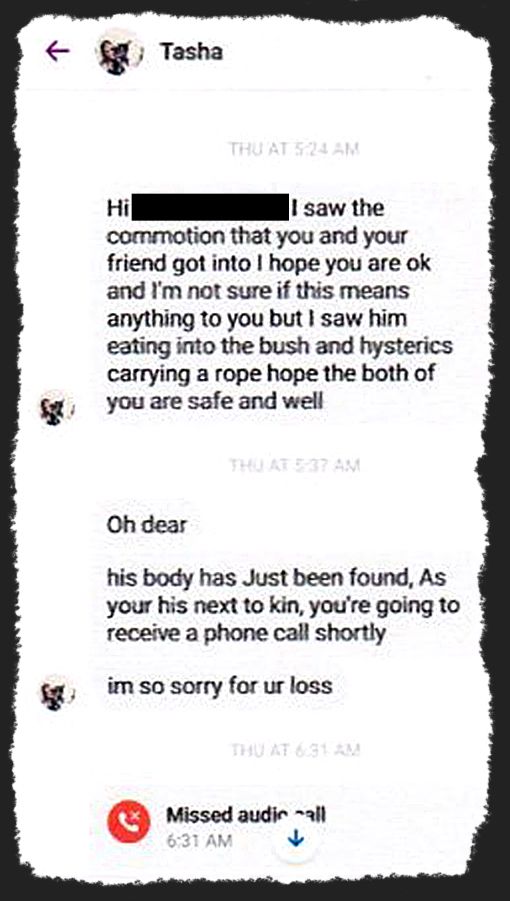
Three hours later, while still being treated for the blows to his head, Luke received an automated voice message claiming to be Rob Tanner from search and rescue.
“We have sadly found what we believe to be [Williams’] remains and require you to formally identify him,” it said.
Luke was so upset, nurses phoned police who confirmed the information was bogus.
His workplace also received a “malicious” phone call the next day.
Luke said police advised him to vacate his home and if it was not for friends giving up their couches, his only option was the Night Shelter.
It was “a pity” he was not a woman or he could have used Women’s Refuge, he recalled officers saying.
InsideOUT Koaro managing director Tabby Besley said the case was emblematic of a “huge flaw” in the country’s support systems.
“It shows how much work there is to be done,” she said.
The issue was certainly not limited to gay men and Ms Besley said the challenges for those victimised in the trans community were particularly acute.
Because unhealthy rainbow relationships were neglected in the domestic-violence discourse, it buried the topic further.
“I think there’s often a lot of shame and hesitancy to talk about it,” she said.
“People have these false ideas . . . that in queer relationships that doesn’t happen because the world at large shows us only a heteronormative view on violence.”
Ms Besley called for “better solutions, less binary gendered approaches and rainbow-specific services” to address the oversights.
Over the days after the assault, Luke was exposed to heavy-breathing phone calls, emails from anonymous accounts alluding to the impending expiry of the newest police safety order and Williams deflated one of the victim’s car tyres when it was parked outside his workplace.
Despite an order prohibiting contact, he repeatedly emailed Luke asking for his possessions, flip-flopping daily between abusive (“you really are a special kind of weak”) and tender (“I would have loved and cared abut u forever” [sic]).
“There was nowhere I felt safe,” Luke said.
He worked to exhaustion, pulling double shifts, sleeping four hours a night. He stopped eating, sought refuge in retail therapy and at one stage had hoarded 24 unbuilt Lego sets.
On February 21, the court made a protection order in favour of the victim, a breach of which could land Williams behind bars for up to three years.
It deterred him for a couple of weeks.
By that stage Williams’ life was crumbling.
He had criminal charges pending over the assault and he had been given the boot from his flat over his threatening behaviour and drug use.
With just days before he was due to vacate the property, his landlord received a phone call from Dunedin police’s Senior Sergeant Anthony Bond who said he would be charged for illegally entering Williams’ room.
But it was not Snr Sgt Bond.
Police only discovered Williams’ deception when the landlord sent them an indignant email objecting to the “rude, aggressive” call he received.
“I am instructing counsel to prepare a formal complaint against Bond to the Independent Police Conduct Authority. His conduct was not only without legal foundation but was insulting and intimidating,” he wrote.
Mess . . . Joshua Williams was kicked out of his Dunedin flat over his behaviour and drug use. PHOTOS: SUPPLIED




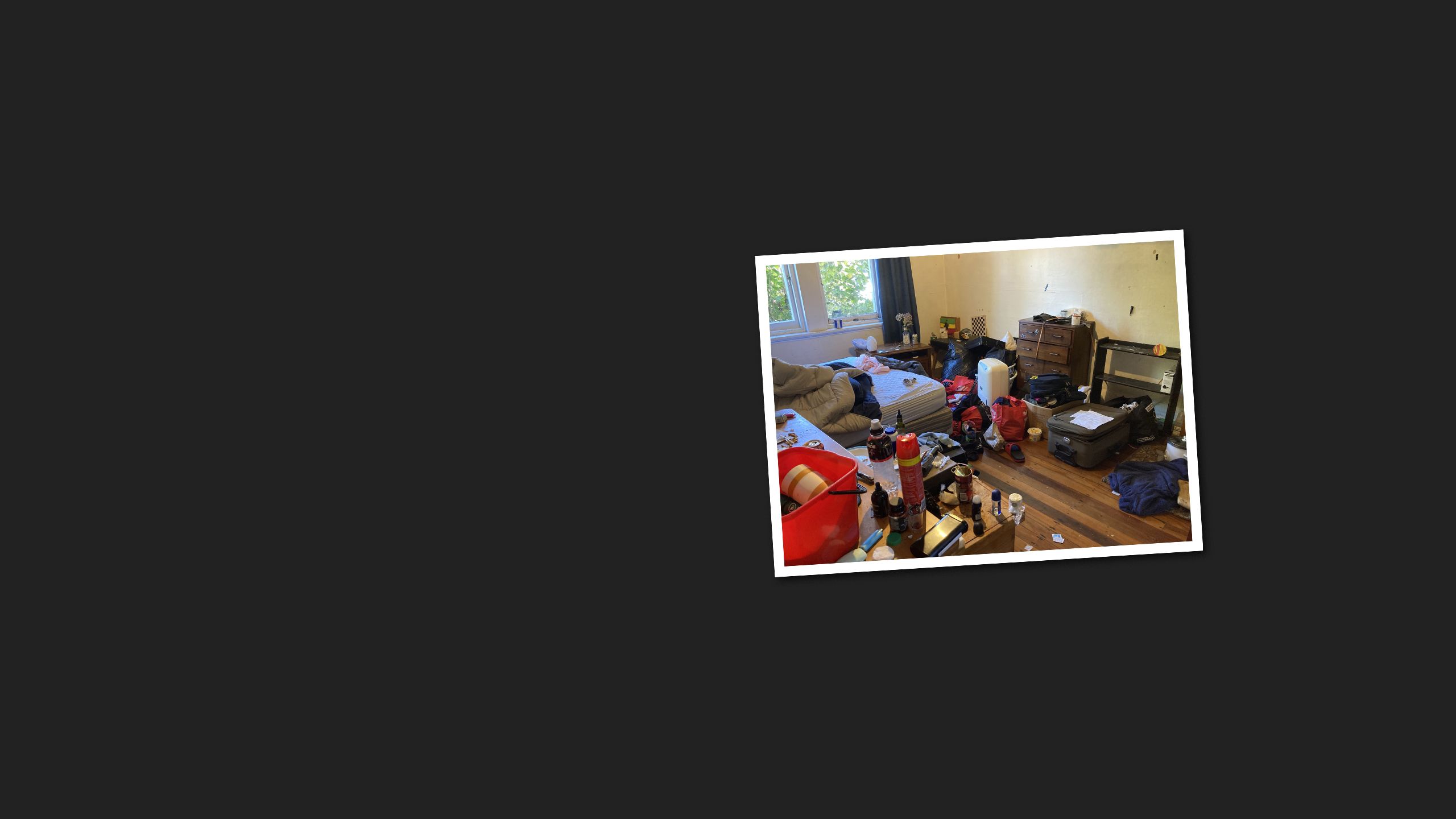


At Williams’ sentencing recently, the Dunedin District Court heard how he doubled down on the deception.
Two days after duping his landlord, he called Luke claiming to be Constable Scott Turner, threatening him with perverting the course of justice for supposed errors in an affidavit.
The victim, however, recognised the voice of his ex-partner and hung up.
Williams’ counsel Meg Scally told the court her client had an “extremely chaotic and dysfunctional childhood”, which had led to drug and alcohol abuse from an early age.
Judge Michael Turner noted the defendant continued to blame Luke for the assault and said the seriousness of his crimes appeared to be escalating.
Williams pleaded guilty to assault in a family relationship, wilful damage, breaching a protection order, attempting to pervert the course of justice and impersonating police.
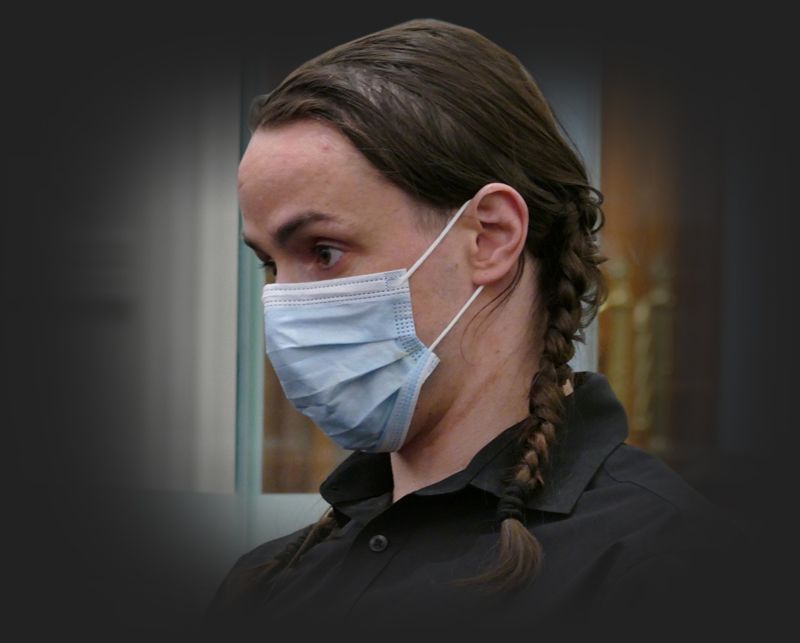
Again . . . Williams was jailed for two
years three months on a slew of charges.
PHOTO: ROB KIDD
He was jailed for 27 months but, because of the time he spent in custody on remand, he will see the Parole Board this month.
It was only after charges had been laid that Luke discovered Williams had an extensive criminal record featuring 78 convictions over the last 16 years (one of which was for threatening to kill his grandmother in 2007).
While preparing the paperwork for the protection-order application Luke also came across the police report on the Queenstown incident in which an officer described him as “naive and vulnerable”.
To see himself through the eyes of others was confronting and the words continued to reverberate months later.
“I feel like such an idiot that I got into this situation in the first place,” Luke said.
“I’m working to ensure this never happens to me again.”
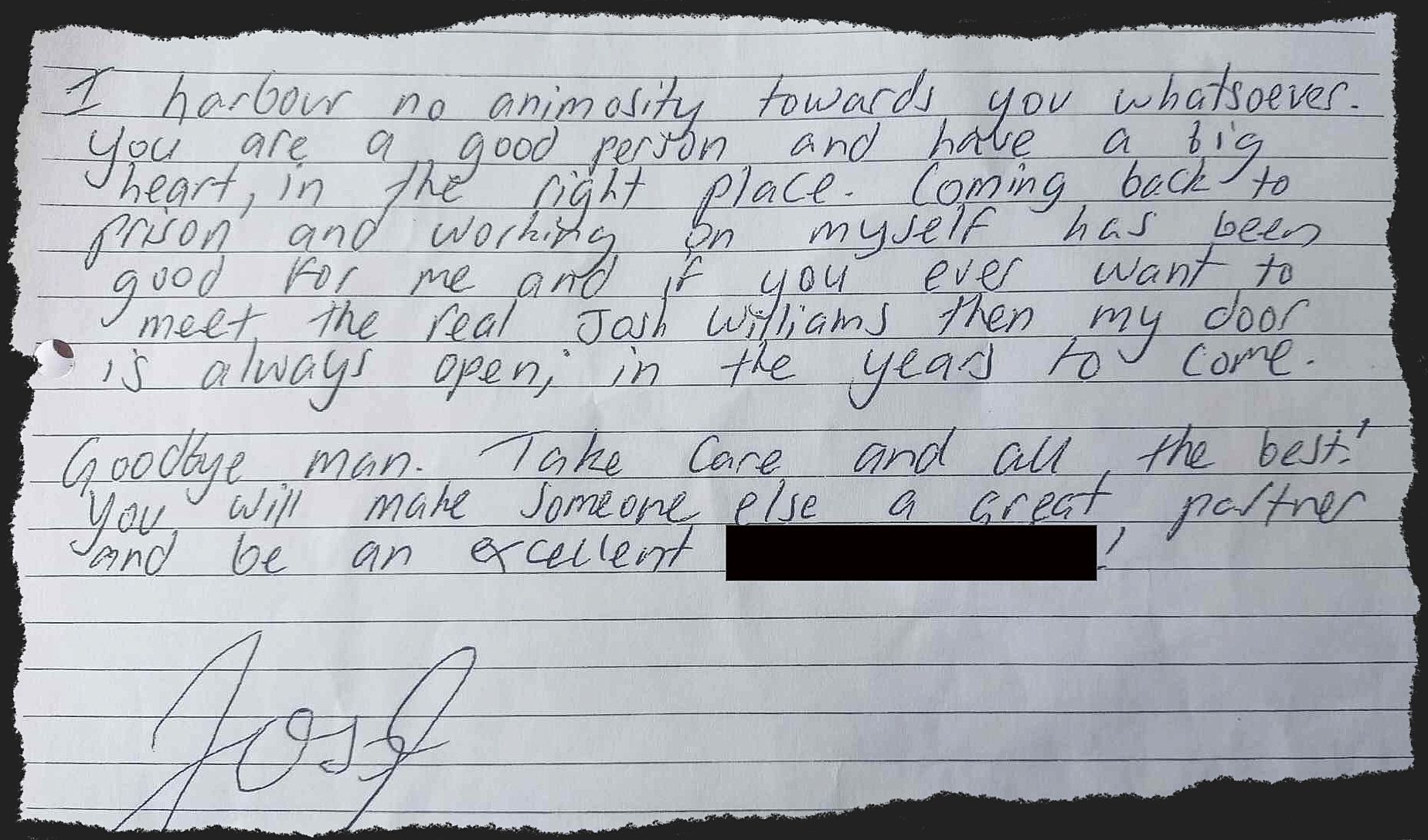
In a letter tendered to the court at sentencing, Williams apologised to Luke and said his actions were driven by “attachment issues”.
“If you ever want to meet the real Josh Williams then my door is always open,” he wrote.
“I’m pretty sure I did,” Luke said.
By the time Williams was released, Luke planned to have left Dunedin.
rob.kidd@odt.co.nz
*Name changed to protect anonymity

A Dunedin man believed his new boyfriend was funny, driven, authentic — not a veteran criminal with dozens of convictions. Rob Kidd reports on a hook-up that became a relationship that became a nightmare.
Before Josh Williams was impersonating a cop or announcing his own death as a search and rescue coordinator, before he was a self-styled, satirical news anchor or a violent meth addict, he was a clenched torso on Grindr.
He messaged Luke* on the gay cruising app and while his photos may have exaggerated his stature, the 33-year-old compensated for it with charm.
Luke had repressed his sexuality while growing up, and dating in Dunedin was an exciting, if terrifying, prospect.
“I had only just given myself permission to be gay,” he told the Otago Daily Times.
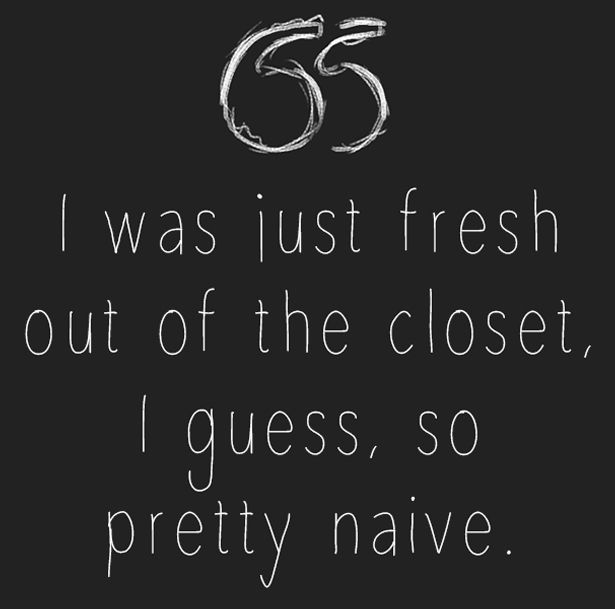
After their initial meeting in November 2021, he saw the man 10 years his senior increasingly frequently.
Luke said he was drawn to Williams’ authenticity.
“I thought he was mature, he was living by himself, he talked about his career,” he said.
“He just came across like a grown-up.”
They cooked together, visited op-shops, took day trips to the beach.
Williams formalised his intentions with a “date-me cake” bought from New World; a frugal gesture but one which made their relationship official.
With the turn of the year, however, came seismic change.
Williams’ grandmother, the woman who had raised him, was seriously sick and deteriorating rapidly.
Her worsening health became the catalyst for Williams’ drug use, which was sudden in its onset, and he made no attempt to conceal it from Luke.
It coincided with other high-risk behaviour too.
Williams attended an anti-vax rally just to immerse himself in the outrage and controversy; during university orientation week he would approach the most masculine-looking men on the street and kiss Luke in front of them.
Luke recalled him at the height of his drug-addled grief, walking blindly into the five-road intersection by Knox Church.
Luke followed him into the torrent of traffic.
The narcotics, the mood swings, the self-destruction on which Williams seemed intent, only ramped up with his grandmother’s death in March last year.
But the more reasons he gave Luke to leave him, the more he gave him to stay.
“I was engulfed,” Luke said.
“I was scared and I froze . . . I just felt like he’s going to need someone there.”
The dynamics of their relationship gradually became entrenched.
When Williams, in his intoxicated state, inevitably misplaced his wallet, phone, keys or vape it was Luke’s job to find them.
“I was bringing him dinners, little food parcels that I made at my flat,” he said. “He didn’t eat them. They stayed in his fridge.”
They became care-giver and patient, parent and child.
If Luke was with friends, Williams would message him incessantly, alternating between affection and anxiety.
One night, when Luke switched on his phone after going to the cinema, there were dozens of messages, charting the chaotic fluctuations of his boyfriend’s mind over the previous three hours.
Yet the more needy Williams was, the more Luke felt needed.
And so the status quo was cemented — until an impromptu trip to Queenstown.
In 2021, Williams started a tongue-in-cheek YouTube current-affairs show dubbed “Newsyland”.
As the not-so-subtly named “Richard Pullman”, or variations of that name, he gave his uncensored take on topical issues, reading stiffly from an autocue.
The low-budget, basement production passed 1000 viewers with its first episode but failed to reach half that number through its five subsequent editions.
Alter ego . . . Williams presented a low-budget, online current-affairs show called “Newsyland”. VIDEO: YOUTUBE
With the approach of the local elections, though, Williams relaunched the show under “Decision Dunedin”, surprisingly securing an interview with soon-to-be mayor Jules Radich.
On September 16 last year, Williams proposed a trip to Queenstown to interview the ever-polarising Michael Laws and they hit the road.
Though Luke agreed to drive, the rigours of the relationship were taking their toll and a petty argument from which he would have ordinarily retreated, marked a turning point.
The spat became a full-blown shouting match on the outskirts of the tourist hotspot and passing police stopped to separate the pair.
Williams was identified as the aggressor and a police safety order was imposed, banning him from contacting Luke for 12 hours.
They returned home together with Luke convinced the confrontation was an overreaction on his part, but there was an irreparable rupture in their bond.
Just as he was considering a split, another kind of break dragged him back.
Williams broke his leg in a road accident and now needed his boyfriend more than ever.
His immobility though, made him more demanding and the cracks in the relationship widened as Luke embarked on a series of tiny rebellions.
He said Williams was enraged when he found out rather than being at home as he had said, Luke was playing Monopoly at a friend’s house.
By December, the arguments — usually by message — intensified, as did the emotional manipulation.
Williams inadvertently sent Luke a voice message in which the sound of the Grindr notification bell was audible.
The next morning, he left another breathless audio recording, claiming he was dying.
Luke had become numb to the melodramatics and had started to confide in friends about the toxic relationship in which he had become entangled.
On February 2, when Luke revealed some of his friends’ comments on his phone to Williams, he wanted to see more.
Luke said the disagreement became physical when Williams pulled out a methamphetamine pipe and Luke tried to snatch it away, causing it to break.
They ended in a heap on the bed before Williams went outside and demanded they settle their differences with a fight.
Luke’s pugilistic experience was nil.
“My first instinct was to tickle him,” he said.
The unconventional tactic was ineffective and following a flurry of punches, Luke was running down the hill to the hospital, blood streaming from his nose.

Before he could be admitted to ED there was a final fracas as Williams punched himself in the head and tried to claim he was the victim.
“That was just the beginning,” Luke said.
Within minutes of blocking Williams’ number and social-media profiles from his hospital bed, Luke was contacted by a Facebook account in the name of “Tasha Dermott”, claiming she had seen the assault.
She said she had then seen Williams going into the bush in “hysterics”, carrying a rope.
“His body has just been found. As your his next to kin, you’re going to receive a phone call shortly. Im so sorry for ur loss,” (sic) the message said.

Three hours later, while still being treated for the blows to his head, Luke received an automated voice message claiming to be Rob Tanner from search and rescue.
“We have sadly found what we believe to be [Williams’] remains and require you to formally identify him,” it said.
Luke was so upset, nurses phoned police who confirmed the information was bogus.
His workplace also received a “malicious” phone call the next day.
Luke said police advised him to vacate his home and if it was not for friends giving up their couches, his only option was the Night Shelter.
It was “a pity” he was not a woman or he could have used Women’s Refuge, he recalled officers saying.
InsideOUT Koaro managing director Tabby Besley said the case was emblematic of a “huge flaw” in the country’s support systems.
“It shows how much work there is to be done,” she said.
The issue was certainly not limited to gay men and Ms Besley said the challenges for those victimised in the trans community were particularly acute.
Because unhealthy rainbow relationships were neglected in the domestic-violence discourse, it buried the topic further.
“I think there’s often a lot of shame and hesitancy to talk about it,” she said.
“People have these false ideas . . . that in queer relationships that doesn’t happen because the world at large shows us only a heteronormative view on violence.”
Ms Besley called for “better solutions, less binary gendered approaches and rainbow-specific services” to address the oversights.
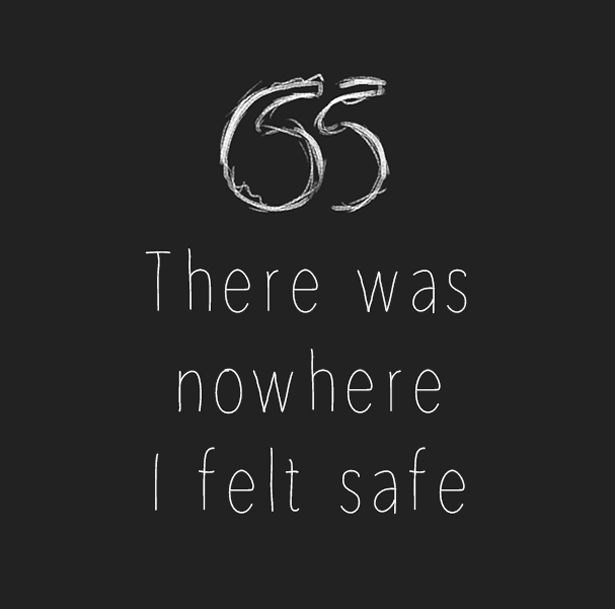
Over the days after the assault, Luke was exposed to heavy-breathing phone calls, emails from anonymous accounts alluding to the impending expiry of the newest police safety order and Williams deflated one of the victim’s car tyres when it was parked outside his workplace.
Despite an order prohibiting contact, he repeatedly emailed Luke asking for his possessions, flip-flopping daily between abusive (“you really are a special kind of weak”) and tender (“I would have loved and cared abut u forever” [sic]).
“There was nowhere I felt safe,” Luke said.
He worked to exhaustion, pulling double shifts, sleeping four hours a night. He stopped eating, sought refuge in retail therapy and at one stage had hoarded 24 unbuilt Lego sets.
On February 21, the court made a protection order in favour of the victim, a breach of which could land Williams behind bars for up to three years.
It deterred him for a couple of weeks.
By that stage Williams’ life was crumbling.
He had criminal charges pending over the assault and he had been given the boot from his flat over his threatening behaviour and drug use.
With just days before he was due to vacate the property, his landlord received a phone call from Dunedin police’s Senior Sergeant Anthony Bond who said he would be charged for illegally entering Williams’ room.
But it was not Snr Sgt Bond.
Police only discovered Williams’ deception when the landlord sent them an indignant email objecting to the “rude, aggressive” call he received.
“I am instructing counsel to prepare a formal complaint against Bond to the Independent Police Conduct Authority. His conduct was not only without legal foundation but was insulting and intimidating,” he wrote.
Mess . . . Joshua Williams was kicked out of his Dunedin flat over his behaviour and drug use. PHOTOS: SUPPLIED
At Williams’ sentencing recently, the Dunedin District Court heard how he doubled down on the deception.
Two days after duping his landlord, he called Luke claiming to be Constable Scott Turner, threatening him with perverting the course of justice for supposed errors in an affidavit.
The victim, however, recognised the voice of his ex-partner and hung up.
Williams’ counsel Meg Scally told the court her client had an “extremely chaotic and dysfunctional childhood”, which had led to drug and alcohol abuse from an early age.
Judge Michael Turner noted the defendant continued to blame Luke for the assault and said the seriousness of his crimes appeared to be escalating.
Williams pleaded guilty to assault in a family relationship, wilful damage, breaching a protection order, attempting to pervert the course of justice and impersonating police.

Again . . . Williams was jailed for two
years three months on a slew of charges.
PHOTO: ROB KIDD
He was jailed for 27 months but, because of the time he spent in custody on remand, he will see the Parole Board this month.
It was only after charges had been laid that Luke discovered Williams had an extensive criminal record featuring 78 convictions over the last 16 years (one of which was for threatening to kill his grandmother in 2007).
While preparing the paperwork for the protection-order application Luke also came across the police report on the Queenstown incident in which an officer described him as “naive and vulnerable”.
To see himself through the eyes of others was confronting and the words continued to reverberate months later.
“I feel like such an idiot that I got into this situation in the first place,” Luke said.
“I’m working to ensure this never happens to me again.”

In a letter tendered to the court at sentencing, Williams apologised to Luke and said his actions were driven by “attachment issues”.
“If you ever want to meet the real Josh Williams then my door is always open,” he wrote.
“I’m pretty sure I did,” Luke said.
By the time Williams was released, Luke planned to have left Dunedin.
rob.kidd@odt.co.nz
*Name changed to protect anonymity